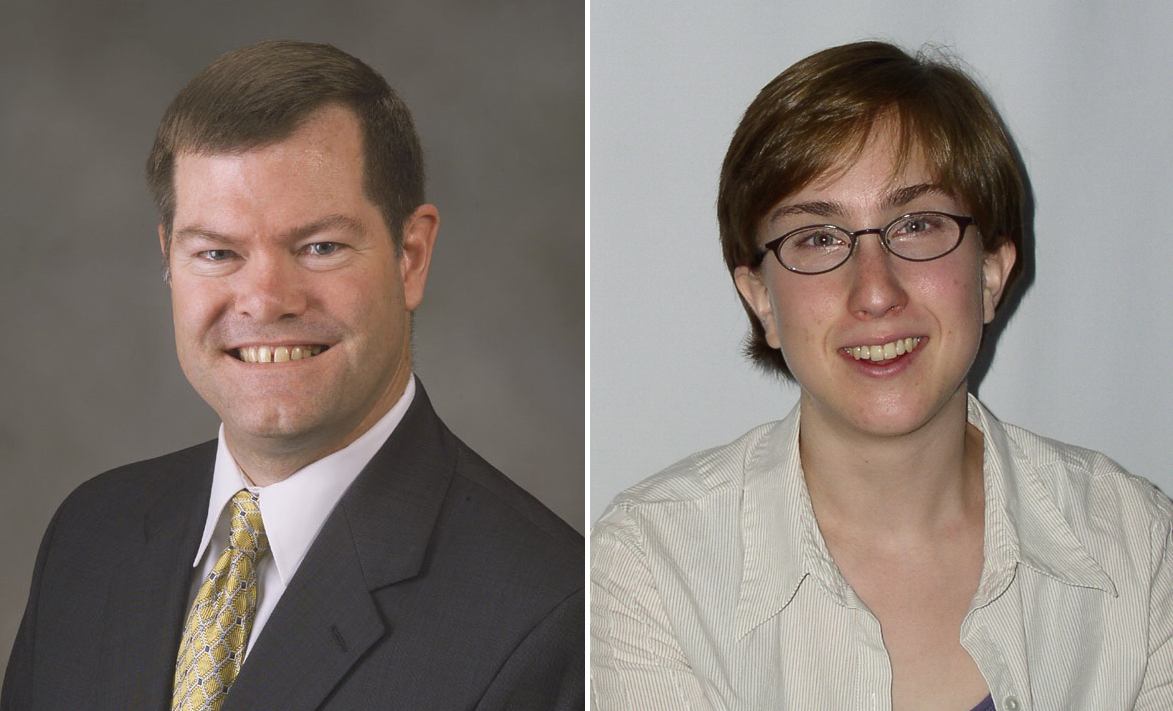Nuclear engineers to develop protective shield material

Virginia Tech's nuclear engineering program has received two awards valued at more than $1 million from the Department of Energy's Nuclear Energy University Program.
One is an $800,000, three-year award to develop an outer shield material for use in packaging spent nuclear fuel and high-level waste for prolonged storage. Leigh Winfrey, assistant professor of mechanical engineering, and her colleague Mohamed Bourham, professor of nuclear engineering of N.C. State, received this research contract.
The second award for $300,000 will allow the Virginia Tech nuclear program, housed in the mechanical engineering department, to purchase a neutron generator system to create a Neutron Irradiation Laboratory. Mark Pierson, associate professor of mechanical engineering, is the principal investigator on this grant, and Celine Hin, assistant professor of mechanical engineering and materials science and engineering, and Alireza Haghighat , director of the Virginia Tech Nuclear Science and Engineering Laboratory, part of the Institute for Critical Technology and Applied Science, are the co-investigators.
"The integrity and survivability of a nuclear waste package is critically important in the transport of nuclear fuel and high-level waste," said Winfrey, who co-holds four invention disclosures related to novel electrothermal plasmas that are used in applications ranging from fusion reactor fueling to weaponry to combustion to materials deposition technologies.
In her research with Bourham, who is one of the co-holders of the invention disclosures, Winfrey says she hopes to develop an outer shield material for use in packaging that is resistant to corrosion, radiation, diffusion, and thermal cycling processes that affect fuel packages during long-term storage. The material will also need to be wear-tolerant and mechanically robust so that it can survive repeated handling and transportation.
Based on her earlier research, Winfrey said the development of this new multi-layer composite coating will provide the robust material needed to insure safe long-term storage of high-level waste and its safe transport. Winfrey's proposed package shielding should provide a barrier to prevent water, dirt, and chemical contaminants from the atmosphere or the soil from making contact with waste packages that would damage and weaken them during long-term storage.
"Further, the coating material incorporates components that protect the structural materials used in the packages and enhances their mechanical properties so that the waste package may be moved or transported as necessary over the storage lifetime," Winfrey explained.
The coating is different from existing protective shields in that it is not a thermal coat that is sprayed onto the material. Rather, it will be a three-component coating that provides the multi-purpose barrier. "Through this research effort, the team will develop multi-component, multi-layered coatings and will evaluate and optimize a three-component coating for the outside of waste packages that will provide a multi-purpose barrier," Winfrey added.
The neutron generator system awarded to the nuclear engineering program in the Department of Mechanical Engineering will support planned and current courses in the areas of radiation detection and measurement, radiation shielding, nuclear nonproliferation and safeguards, and particle transport. Having a dedicated neutron source on campus will create a type of "neutron literacy" among the students and graduates of the program. In addition, it will support ongoing research activities in the areas of radiation detection and materials, nuclear materials, reactor physics and design, nuclear security and safeguards, nuclear forensics, homeland security, medical physics, and medical isotope production.
With this addition, which will help facilitate Winfrey's work, "we will be able to provide cutting-edge nuclear science and engineering research for the Department of Energy," Pierson said. Moreover this will be the first facility of its kind in the state of Virginia.
Virginia Tech received approval from the State Council of Higher Education for Virginia to award masters and doctoral degrees in nuclear engineering in the summer of 2013. This approval came after Virginia Tech revived its nuclear engineering program in 2007 and soon started offering graduate coursework that allowed a student to earn a master's of engineering degree in mechanical engineering with a nuclear engineering certificate.
The university's long-term vision is to create an interdisciplinary program in nuclear science and engineering, encompassing the nuclear sciences and medicine and reach across several of the Virginia Tech colleges and its medical school.








